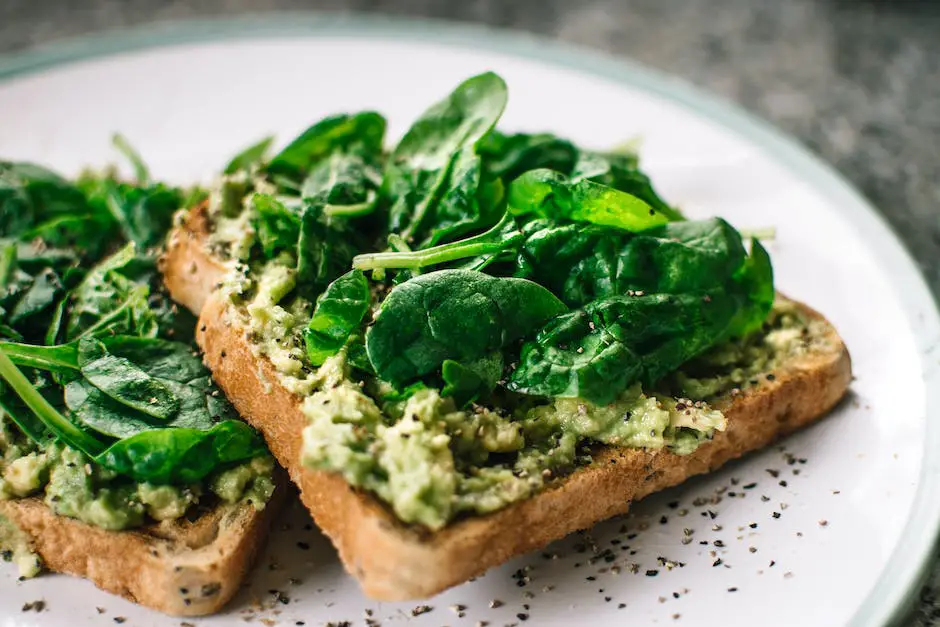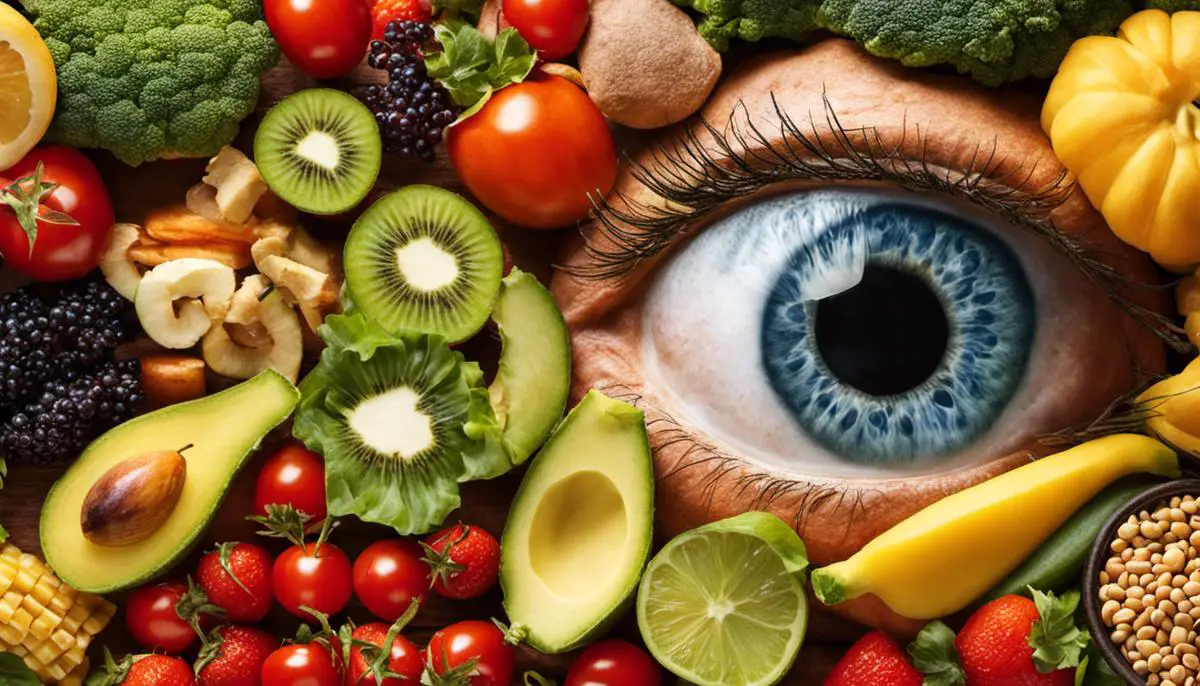Eye Health Nutrients
The health of our eyes, those complex and wonderful windows to the world, relies not just on genetics or age but significantly on our nutritional intake. Providing fuel for bodily functions, nutrition serves as the cornerstone of overall health, including that of the human eye. From understanding the vital structures and operations of the eye to the detrimental influences of nutrient lack, we delve into the intricate relationship between nourishment and ocular health.
Furthermore, igniting awareness about the essential nutrients, their food sources, supplementary forms, and the essentiality of lifestyle modifications takes center stage in this enlightening exploration.
The Human Eye: Structure and Function
The human eye is a highly complex organ that allows us to perceive our surrounding environment in detailed color and depth. It comprises several major components including the cornea, the retina, and the lens. The cornea, a clear front surface of the eye, enables the light to enter. The retina, situated at the back of the eye, contains photoreceptor cells that convert light signals into electrical impulses. The lens focuses the light onto the retina, contributing to clear vision.
Eye movement and adaptation to light are regulated by a set of muscles and processes. The functioning of these components collaboratively provides vision to humans. However, maintaining the health of the eye and ensuring its optimal function necessitates appropriate nutrition.
Common Eye Disorders
Several ocular diseases and disorders can adversely affect human vision. They include age-related macular degeneration (AMD), cataracts, glaucoma, and diabetic retinopathy. AMD, a leading cause of vision loss in older adults, involves damage to the macula – a small area in the retina responsible for sharp, central vision.
Cataracts, characterized by the clouding of the eye’s lens, is another common vision impediment, especially amongst older adults. Glaucoma, a group of eye conditions causing optic nerve damage, leads to gradual vision loss and can result in blindness if not treated. Diabetic retinopathy, associated with diabetes, damages blood vessels in the retina and can also lead to severe vision loss or blindness.
Eye Health Nutrition and Eye Health

Nutrition plays a crucial role in maintaining eye health and combating ocular diseases. A diet rich in certain vitamins and minerals can help preserve vision and decrease the risk of certain eye diseases. For example, antioxidant vitamins like Vitamin C and E can lower the risk of cataracts and AMD.
The minerals zinc and copper, Omega-3 fatty acids, and the antioxidants lutein and zeaxanthin are others that have been specifically linked to eye health. They are believed to benefit the eyes by protecting against cellular damage and helping to maintain the health of ocular tissues.
Role of Inadequate Nutrition
Inadequate nutrition can significantly contribute to the development and progression of eye diseases. For instance, a deficiency of vitamin A can lead to night blindness. Poor dietary intake of antioxidants and consumption of alcohol or tobacco can increase the risk of AMD and cataracts.
More importantly, diseases like obesity and type-2 diabetes, often linked to poor nutrition, can be major risk factors for developing glaucoma and diabetic retinopathy. Therefore, nutritional deficiencies not only directly impact eye health but also indirectly contribute by escalating the risk of other health ailments linked to eye diseases.
Importance of Eye Health Nutrients
Given the significant role of various nutrients in maintaining eye health, emphasis on a nutrient-rich diet becomes crucial. Supplementing the diet with essential vitamins, minerals, and antioxidants can help fill dietary gaps and further support eye health.
Eye health nutrients, like lutein and zeaxanthin, help protect the eye from harmful light and oxidative damage. Omega-3 fatty acids are vital for maintaining the health of the retina. The antioxidant properties of vitamins A, C, and E help protect the eye cells from damage.
Role of Nutrition in Upholding Eye Health
Eye health can be significantly attributed to proper nutrition, serving as a protective shield against a range of ocular disorders. It’s crucial, though, to note that dietary supplements should only act as a supplement to a balanced, nutrient-rich diet and not as a replacement.
In essence, a clear understanding of the interconnectedness of ocular health, dietary intake, and the possibility of eye diseases can pave the path for both preventive and supportive procedures to conserve ocular wellness. A diverse nutritional-filled diet can provide ample support to uphold healthy vision and ward off eye diseases.

Photo by monstruoestudio on Unsplash
Vital Eye Health Nutrients for Eye
Vitamin A: A Vital Nutrient for Eye Health
Vitamin A sits in the front row as a critical nutrient contributing to eye health. This group of antioxidants delivers significant impacts on vision, bone growth, and immune health, among many. Particularly pertinent to ocular health, Vitamin A acts as the shield for the cornea and paves the way for our eyes to efficiently adapt to changes in light intensity.
A lack of Vitamin A can culminate in night blindness, causing the eyes to struggle with adjustments in lower light conditions. In more serious instances, a Vitamin A deficiency can escalate to corneal ulcers, scarring, or even absolute blindness.
Vitamin C for Eye Health
Vitamin C is another crucial nutrient for eye health. This antioxidant is key in fighting against the oxidative damage done by free radicals in the body, including the eyes. Adequate intake of Vitamin C has been associated with reduced risks of cataracts and age-related macular degeneration. Chronic deficiencies of Vitamin C lead to a disease called scurvy, which, while rare, often includes symptoms such as eye pain and potential blindness.
Vitamin E and Eye Health
Another antioxidant vital for the eyes is vitamin E. This vitamin guards against harmful molecules termed ‘free radicals’ that are suspected of contributing substantially to the aging process. Just like Vitamin C, Vitamin E contributes to the reduction of developing cataracts and age-related macular degeneration. Deficiency of this vitamin, though rare, can lead to severe visual impairment.
Beta-Carotene and Eye Health
Beta-Carotene is a carotenoid and antioxidant that can be converted into Vitamin A by the body. High quantities of this nutrient are found in certain fruits, vegetables, and grains. Just like Vitamin A, Beta-Carotene contributes to maintaining a healthy vision, protecting the cornea and helping the eyes adjust to light changes. Over time, its deficiency can also lead to similar complications as a deficiency of Vitamin A.
Omega-3 Fatty Acids for Eye Health
Omega-3 fatty acids are critical components of the retina’s cell membranes, contributing to visual development and retinal function. There’s emerging evidence suggesting that these fatty acids may decrease the risk of macular degeneration and dry eye syndrome. A deficiency of omega-3s can lead to dry eyes and other eye health issues.
Lutein, Zeaxanthin, and Eye Health
Lutein and zeaxanthin are carotenoids and antioxidants found in high concentrations in the macula, a part of the retina. They help protect the eyes from damage caused by free radicals and exposure to high energy light rays like UV light. Consuming high amounts of lutein and zeaxanthin can reduce the risk of chronic eye diseases, including age-related macular degeneration and cataracts.
The Importance of Zinc in Eye Health
Zinc, a vital trace mineral, significantly contributes to eye health. It transports Vitamin A from the liver to the retina, thereby aiding the production of melanin, a pigment essential for the eyes’ protection. Insufficient levels of zinc might lead to complications such as impaired night vision, the development of cataracts, and even age-related macular degeneration.

Photo by anikolleshi on Unsplash
Foods that promote Eye Health
Nourishing Your Eyes With Nutrient-Dense Foods
There is an array of food rich in vital vitamins and minerals beneficial for eye health. Take, for example, foods overflowing with Vitamin A like carrots, sweet potatoes, and spinach, are instrumental in preventing conditions such as night blindness and dry eyes. Similarly, citrus fruits like oranges and grapefruits, containing abundant Vitamin C, are also integral to promoting eye health, notably in reducing the risk of cataract development.
Moreover, the antioxidants Lutein and Zeaxanthin act as shields for the eyes against harmful high-energy light waves, including harmful ultraviolet rays, abundant in sunlight. You can find these eye-protecting antioxidants predominantly in nutrient-rich leafy greens such as spinach, kale, and collard greens. In the same vein, Bioflavonoids that safeguard against cataracts and macular degeneration, are predominantly present in fruits, vegetables, tea, and wine.
Eye Health and Dairy Products
Dairy products, particularly those rich in Vitamin A and Zinc, can contribute to maintaining good eye health. Vitamin A protects the cornea while zinc helps bring that vitamin to the eyes from the liver. Zinc is also found in high protein sources like meat and shellfish.
Omega-3 Rich Foods and Eye Health
Omega-3 fatty acids, which are prevalent in oily fish like salmon, sardines and tuna, not only contribute to general health but are also vital for eye health. These good fats may help protect the eyes against dry eye syndrome, macular degeneration, and even cataracts.
Eye Health and Whole Grains
A diet high in foods with a low glycemic index (GI) can help reduce your risk for age-related macular degeneration. Swap refined carbohydrates for quinoa, brown rice, whole oats, and whole-wheat bread and pasta.
Incorporating Eye-health Nutrients in Daily Diet
Knowing the specific nutrient-rich foods that promote eye health is the first step, but incorporating these foods into your daily diet is equally important. For breakfast, consider a whole grain cereal with fruit or eggs with spinach and salmon. For lunch, a salad packed with colorful fresh vegetables and a sprinkling of nuts can be a good option while dinner can incorporate grilled fish or lean meats with a side of leafy green vegetables. Remember to incorporate at least one source of eye health-promoting nutrients in every meal for the best results.
Eye Health Boosting Recipes
To enhance your eye health, you wouldn’t want to miss a spinach and kale salad, embellished with grilled salmon. The leafy greens are a powerhouse of lutein and zeaxanthin, while the fish satisfies your Omega-3 fatty acids needs. Complement this with a tangy fruit salad using citrus fruits and berries – a great source of Vitamin C and bioflavonoids for dessert.
Kickstart your morning with a zesty breakfast smoothie whipped with oranges, strawberries, spinach, and non-fat yogurt. This will provide you a boost of Vitamin C, A, and Zinc all at once. Pair it with a slice of whole grain bread for a sustaining low-glycemic-index breakfast.

Supplements for Eye Health
The Crucial Role of Ocular Nutrients
The significance of proper nutrition in maintaining eye health cannot be underscored enough. Particular nutrients stand out, among them vitamins A, C, and E, zinc, omega-3 fatty acids, lutein, zeaxanthin, and beta carotene – all known for their protective and fortifying effects on the eyes.
These nutrients not only sharpen vision, but also shield the eyes from harmful light rays and oxidative stress. Including them in your diet can help guard against age-related macular degeneration, cataracts, and other ocular discomforts.
Need for Supplements
While the best way to obtain these nutrients is through a nutrient-rich diet comprising fruits, vegetables, lean meats, and fatty fish, this may not always be achievable. Some people may have restrictive diets due to allergies, preferences (such as veganism), or certain medical conditions that make it challenging to get sufficient nutrients from food alone. Also, age-related ocular changes may require higher levels of these nutrients than can be sourced from the diet. In such cases, supplements bridge the nutritional gap, ensuring the body gets the necessary eye-healthy compounds.
Common Over-The-Counter Supplements
Over-the-counter supplements are readily available in drug stores, supermarkets, and online platforms. Examples of common eye health supplements include:
- PreserVision AREDS 2: This supplement is based on the Age-Related Eye Disease Study 2 (AREDS2) by the National Eye Institute. It contains vitamins C and E, zinc, and copper, along with the antioxidants lutein and zeaxanthin.
- Ocuvite: This supplement provides essential nutrients not found in many multivitamin/mineral supplements. It has lutein and zeaxanthin, omega-3, and antioxidants, such as vitamins C, E, and zinc.
- MacuHealth: This is a unique and patented formulation that contains all three macular carotenoids: lutein, zeaxanthin, and meso-zeaxanthin.
Dosages
While the individual dosages of these nutrients can vary, it’s vital to follow the manufacturer’s instructions or a healthcare provider’s guidance. The AREDS2 formula recommends daily doses of 500 milligrams (mg) of vitamin C, 80 mg of zinc, 2 mg of copper, 400 international units (IU) of vitamin E, 10 mg of lutein, and 2 mg of zeaxanthin.
Risks of Over-Consumption
As beneficial as they are, overdoing eye health nutrients is not without risk. Excessive intake can lead to side effects such as nausea, diarrhea, stomach cramps, and in extreme cases, even nerve damage.
High doses of zinc, for instance, can cause stomach upset and even lower immunity if consumed in excessive quantities over time. Regular and extreme overdosing of Vitamin A can lead to dizziness, nausea, coma, and can even be fatal. Therefore, moderation and guidance from a healthcare provider are vital.
It’s critical to underline that while supplements can play a significant role in promoting eye health, they are not silver bullets nor can they replace a well-rounded diet. To enhance visual health, it’s crucial to adopt holistic lifestyle modifications such as receiving sufficient sleep, conducting regular eye examinations, and making use of protective eyewear.

Lifestyle Changes for Better Eye Health
Delving Deeper into Eye Health Nutrients
A plethora of crucial nutrients are required for the eye, a very important organ, to function at its best. These vital nutrients, aptly termed as eye health nutrients, are fe̊ted for their contributions to sustain or enhance vision. They encompass Vitamin A, Vitamin C, Vitamin E, the B Vitamins, Zinc, and Omega-3 fatty acids.
Vitamin A proves to be advantageous for the retina and can mitigate risks associated with night blindness and dry eyes. Antioxidant qualities inherent in Vitamin C and E assist in safeguarding the eyes against detrimental free radicals. B Vitamins, particularly B6, B9, and B12, act as defenses against the onset of age-related macular degeneration (AMD). Omega-3 fatty acids, predominantly found in fish oil, are advantageous for alleviating dry eye symptoms and may contribute to visual improvement.
Although a majority of these nutrients can be obtained from everyday food items, specific individuals may necessitate supplementation. Prior to incorporation of any new supplements into one’s diet, it’s highly recommended to seek advice from a healthcare professional.
Adopting Beneficial Habits
Vision preservation and improvement are not solely reliant on nutrient intake but are also influenced by overall lifestyle habits. Firstly, regular eye examinations are crucial for assessing eye health and identifying any potential issues early. Eye exams can detect problems like glaucoma, cataracts, macular degeneration, and diabetic retinopathy before symptoms become significant.
Opting for protective eyewear like sunglasses and safety glasses when necessary is crucial for protecting the eyes from damage by UV rays and other high-risk situations.
Reducing Screen Time
With the increase of digital device usage, computer vision syndrome or digital eyestrain has become widespread. Spending prolonged periods staring at a screen can cause eyestrain, dryness, blurred vision, headaches, and neck or shoulder pain. To mitigate these effects, the 20-20-20 rule is recommended: every 20 minutes, look at something 20 feet away for at least 20 seconds. Also, adjusting screen brightness, font size, and workstation setup can significantly minimize visual strain.
Incorporating Physical Exercise
Routine physical exercise may significantly lower the chance of developing serious eye conditions, including glaucoma and macular degeneration. Regular exercise improves overall health by regulating blood pressure and preventing diabetes and high blood pressure, both of which can lead to eye disease.
Avoiding Harmful Habits
Lastly, harmful habits, such as smoking and excessive alcohol consumption, can highly affect eye health. For instance, smokers have an increased risk for numerous eye diseases, including cataracts, uveitis, and age-related macular degeneration. Therefore, quitting or avoiding smoking and limiting alcohol consumption is recommended.
In conclusion, maintaining eye health is a multi-faceted effort involving a balanced diet rich in key nutrients, a healthy lifestyle, regular eye check-ups, managing screen time, and avoiding harmful habits like smoking and excessive drinking.

A healthy eye is a resultant of many factors, including balanced nutrition, conscious lifestyle decisions, regular checkups, and an understanding of the nutritional necessities the eye requires to function optimally. Embracing foods abundant in vital nutrients such as vitamins, lutein, and omega-3 fatty acids can significantly contribute to the prevention of various eye ailments. However, the journey doesn’t end with the right diet.
Complementing it with essential lifestyle changes and regular ocular evaluations is crucial for securing eye health. By fostering adequate understanding, embracing necessary actions, and cultivating the ideal lifestyle, one can remain an active participant in maintaining clear, vibrant vision over a lifetime.
Discover more from An Eye Care Blog
Subscribe to get the latest posts sent to your email.


You must be logged in to post a comment.